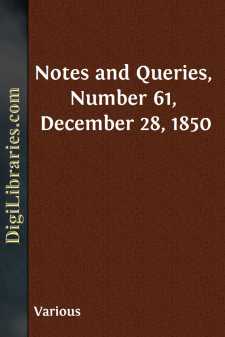Categories
- Antiques & Collectibles 13
- Architecture 36
- Art 48
- Bibles 22
- Biography & Autobiography 813
- Body, Mind & Spirit 142
- Business & Economics 28
- Children's Books 17
- Children's Fiction 14
- Computers 4
- Cooking 94
- Crafts & Hobbies 4
- Drama 346
- Education 46
- Family & Relationships 57
- Fiction 11829
- Games 19
- Gardening 17
- Health & Fitness 34
- History 1377
- House & Home 1
- Humor 147
- Juvenile Fiction 1873
- Juvenile Nonfiction 202
- Language Arts & Disciplines 88
- Law 16
- Literary Collections 686
- Literary Criticism 179
- Mathematics 13
- Medical 41
- Music 40
- Nature 179
- Non-Classifiable 1768
- Performing Arts 7
- Periodicals 1453
- Philosophy 64
- Photography 2
- Poetry 896
- Political Science 203
- Psychology 42
- Reference 154
- Religion 513
- Science 126
- Self-Help 84
- Social Science 81
- Sports & Recreation 34
- Study Aids 3
- Technology & Engineering 59
- Transportation 23
- Travel 463
- True Crime 29
Notes and Queries, Number 61, December 28, 1850
by: Various
Categories:
Description:
Excerpt
NOTES.
ILLUSTRATIONS OF SCOTTISH BALLADS.
In the ballad of "Annan Water" (Border Minstrelsy, vol. iii.) is the following verse:—
"O he has pour'd aff his dapperpy coat,
The silver buttons glanced bonny;
The waistcoat bursted aff his breast,
He was sae full of melancholy."
A very unexpected effect of sorrow, but one that does not seem to be unprecedented. "A plague of sighing and grief," says Falstaff. "It blows a man up like a bladder."
A remarkable illustration of Falstaff's assertion, and of the Scottish ballad, is to be found in this Saga of Egil Skallagrimson. Bodvar, the son of Egil, was wrecked on the coast of Iceland. His body was thrown up by the waves near Einarsness, where Egil found it, and buried it in the tomb of his father Skallagrim. The Saga continues thus:—
"After that, Egil rode home to Borgar; and when he came there, he went straightway into the locked chamber where he was wont to sleep; and there he laid him down, and shot forth the bolt. No man dared speak a word to him. And thus it is said that Egil was clad when he laid Bodvar in the tomb. His hose were bound fast about his legs, and he had on a red linen kirtle, narrow above, and tied with strings at the sides. And men say that his body swelled so greatly that his kirtle burst from off him, and so did his hose."—P. 602.
It is well known that the subjects of many ballads are common to Scotland, and to the countries of Northern Europe. Thus, the fine old "Douglas Tragedy," the scene of which is pointed out at Blackhouse Tower, on the Yarrow, is equally localised in Denmark:
"Seven large stones," says Sir Walter, "erected upon the neighbouring heights of Blackhouse, are shown as marking the spot where the seven brethren were slain; and the Douglas Burn is avowed to have been the stream at which the lovers stopped to drink; so minute is tradition in ascertaining, the scene of a tragical tale, which, considering, the rude state of former times, had probably foundation in some real event."
The corresponding Danish ballad, however, that of "Ribolt and Guldborg," which has been translated by Mr. Jamieson, is not less minute in pointing out the scene of action. The origin of ballads, which are thus widely spread, must probably be sought in very high antiquity; and we cannot wonder if we find them undergoing considerable change in the passage from one country to another. At least the "Douglas Tragedy" betrays one very singular mark of having lost something of the original.
In "Ribolt and Guldborg," when the lady's brothers have all but overtaken the fugitives, the knight addresses her thus:
"Light down, Guldborg, my lady dear,
And hald our steeds lay the renyes here.
And e'en sae be that ye see me fa'
Be sure that ye never upon me ca';
And e'en sae be that ye see me bleed,
Be sure that ye name na' me till dead."
Ribolt kills her father and her two eldest brothers, and then Guldborg can no longer restrain herself:
"Hald, hald, my Ribolt, dearest mine,
Now belt thy brand, for its 'mair nor time....












